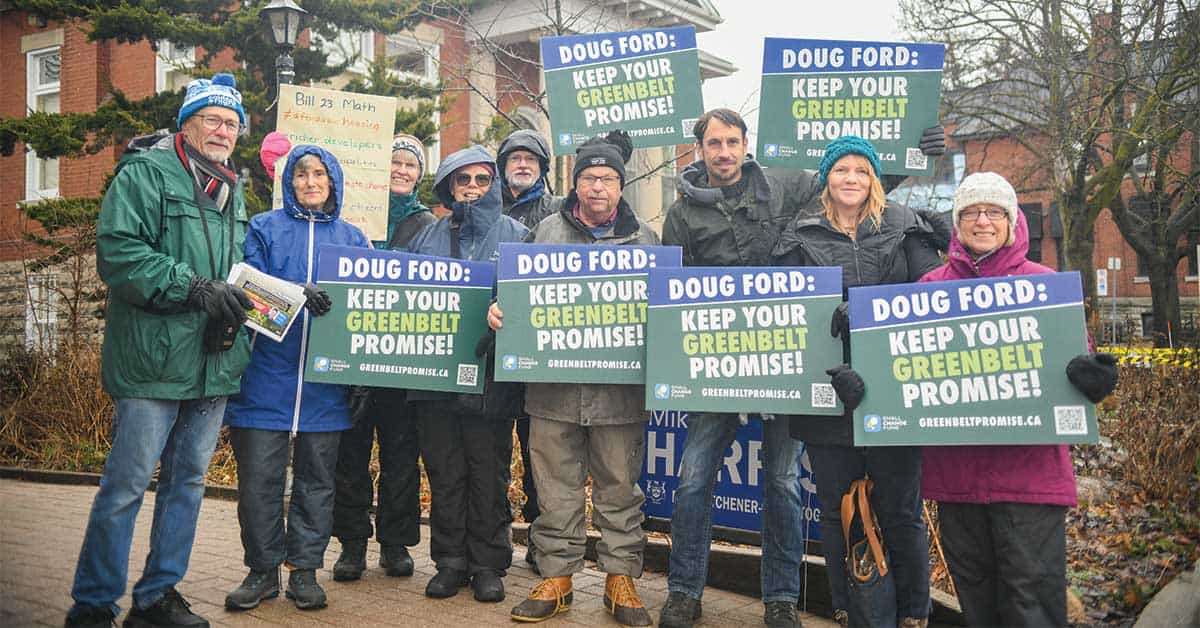Staff at Woolwich and Wellesley townships are raising what they see are red flags about the recently passed Bill 23, the More Homes Built Faster Act.
The wide-reaching bill affects multiple pieces of legislation at once. Last week, Woolwich planning staff presented to council a report outlining Bill 23’s impacts on the municipality. Wellesley Township staff submitted comments to the province on the bill last month.
In these documents, staff outline their issues including the bill’s financial implications, limits to public input in the planning process, its possible negative effect on the environment, the transfer of authority from upper to lower tier municipalities and lack of municipal control over neighbourhoods.
Bill 23 exempts or discounts development charges in various circumstances, including for affordable and non-profit housing and rental units.
Staff at both townships say they are worried this will reduce their capacity to fund the infrastructure needed for growth, that infrastructure projects and services could be eliminated, costs be passed on to existing taxpayers, or townships may be forced to rely on debt. Woolwich notes it already has an exemption on development charges for affordable housing.
The Ford government says municipalities are charging developers too much for development and that these charges are passed on to the homebuyer, adding significantly to the cost of housing. It also maintains municipalities are sitting on the development charges and not using them correctly.
“Municipal fees are adding an average $116,900 to the cost of a single-family home in the GTA. At current interest rates of 5.69 per cent, this adds approximately $812 to a homebuyer’s monthly mortgage payment over 20 years,” said Matt Carter, a spokesperson for the Ministry of Municipal Affairs and Housing. “These fees have only been accumulating in reserves. The province estimates that municipalities across Ontario have about $9 billion in unspent development charge reserves.”
“The status quo isn’t working,” said Kitchener-Conestoga MPP Mike Harris. “We’ve made it very clear that we’re going to put rules in place that will allow municipalities to incent home builders to build more purpose-built rentals and more affordable, true affordable homes, and also ways to make sure that there is housing choice.”
He said that the increase in the municipal taxpayers base should help make up for the shortfall from the missing development charges.
According to Woolwich calculations, the township does not have enough in reserve to fund all the infrastructure projects needed to accommodate growth through 2026. Now, “the township will need to borrow funds through external debt to finance the development charges portion of these projects,” says the staff report.
“I would say it’s a mischaracterization to say we’re sitting on a pile of money,” said Tim Van Hinte, the director of planning for Wellesley Township.
Richard Petherick, Woolwich’s director of finance, takes exception to the suggestion that municipalities are abusing development charges.
“This could not be further from the truth,” he said. “ The Development Charges Act spells out the public process which municipalities are obligated to follow.”
Petherick noted that the collection and use of development charges is a transparent process that includes ample reporting, all available to the public.
“Development charges are meant to have growth pay for growth costs. The existing taxpayers should not be left paying for growth; this should be paid for by those creating the growth, as they will be the ones who benefit the most from any new infrastructure,” he said.
Petherick noted there are many costs the developer is responsible for when building a new subdivision, such as roads, water, sewer and storm infrastructure or sidewalks.
“All of these costs will naturally form part of the cost of each home being built,” he said.
“Development charges are meant to capture the increase costs that will support the growth of these new houses, which could potentially mean upgrades to roads, upsizing water and sewer pipes to accommodate increased flows and again would form part of the cost of each home being built.”
The bill could even cause townships to decide not to construct or upgrade infrastructure, and translate to fewer homes built, he added.
Woolwich staff point out that the changes to the Planning Act would remove the ability for members of the public to appeal a council or committee of adjustment decision. It also removes public meeting requirements for draft plans of subdivision and allows the minister to be able to amend an official plan without request to council or hearing, among other changes.
Deanne Friess, Woolwich’s director of development services, argues the alterations could be problematic.
“Changes in Bill 23 limit who can comment, who can appeal and what can be commented on. This may make this process much more difficult to ensure that we are developing responsibly with fulsome consultation,” she said.
Opponents say Bill 23 erodes local democracy, a point Harris disputes.
“I have to disagree,” he said, pointing to democracy in action.
He notes the townships just finished exercising local democracy through local elections. As well, in the recent provincial election, he won his riding by more than 4,000 votes, and the Progressive Conservative government won the election with 83 ridings while campaigning on building more housing.
“So if people were so concerned about what was going to happen, I would think they may have voted differently,” he said.
When asked if the province is planning to advocate for the federal government to slow down immigration in order to catch up on its housing and health crises, Harris said the province has little say in immigration policy given that it falls under federal jurisdiction.
He said the province has grown very quickly and it has been challenging to keep pace, noting 15 to 20 years of poor planning and challenges has been a problem, that more workers are needed, and that slowing immigration down might not be the answer to the province’s problems.
Other issues township staff brought up were the transfer of planning authority away from upper tier municipalities, making it unclear how region-wide planning and infrastructure services like sewage and water treatment will be carried out and putting strain on the resources of smaller municipalities. They also brought up potential impacts on the environment due to removing conservation authorities’ ability to give natural heritage input, which staff say they rely on and will now need to pay for more external reviews to replace. Bill 23 also eliminates municipal input into site plan approval for projects with ten units or less, a large percentage of the projects in the townships.









